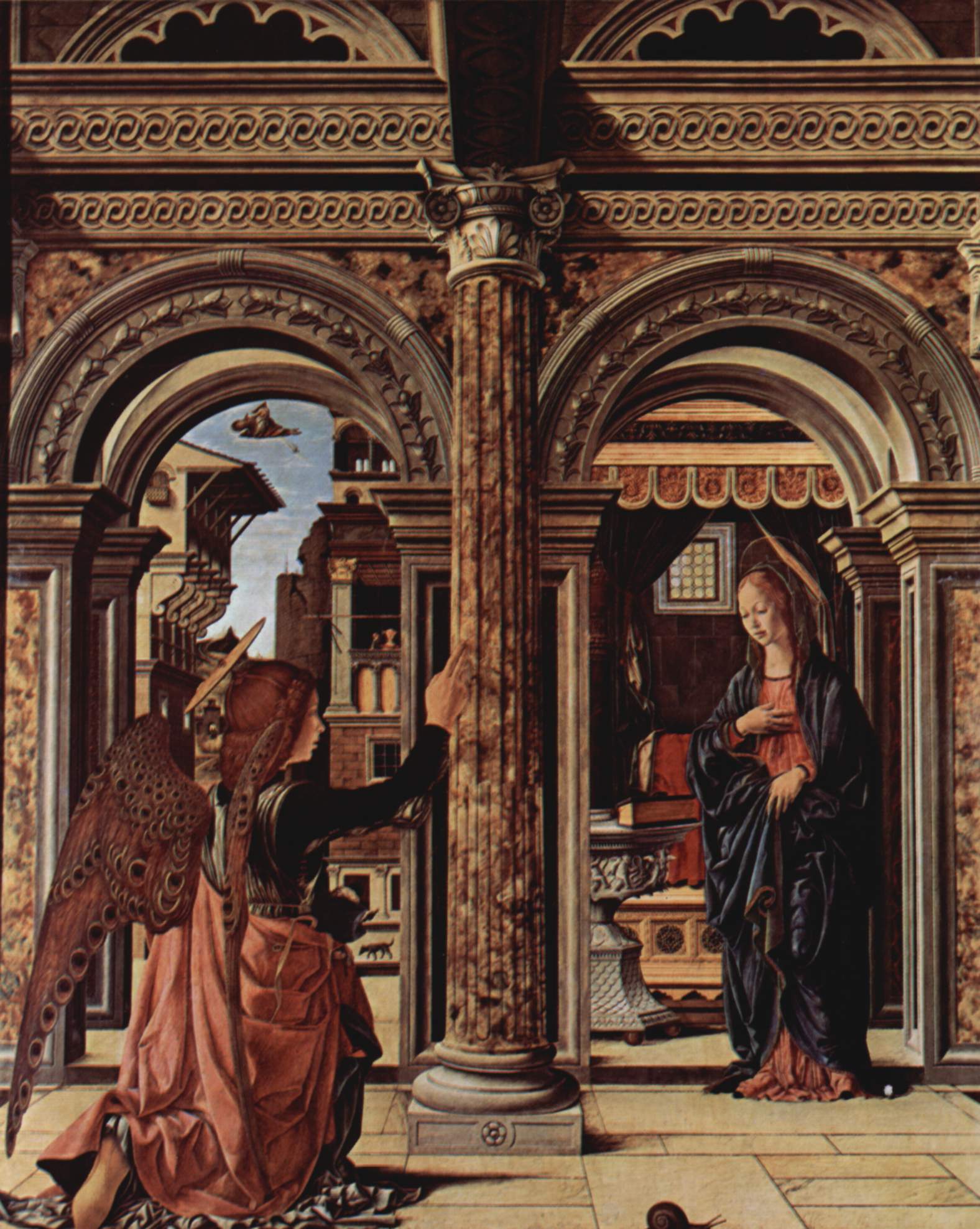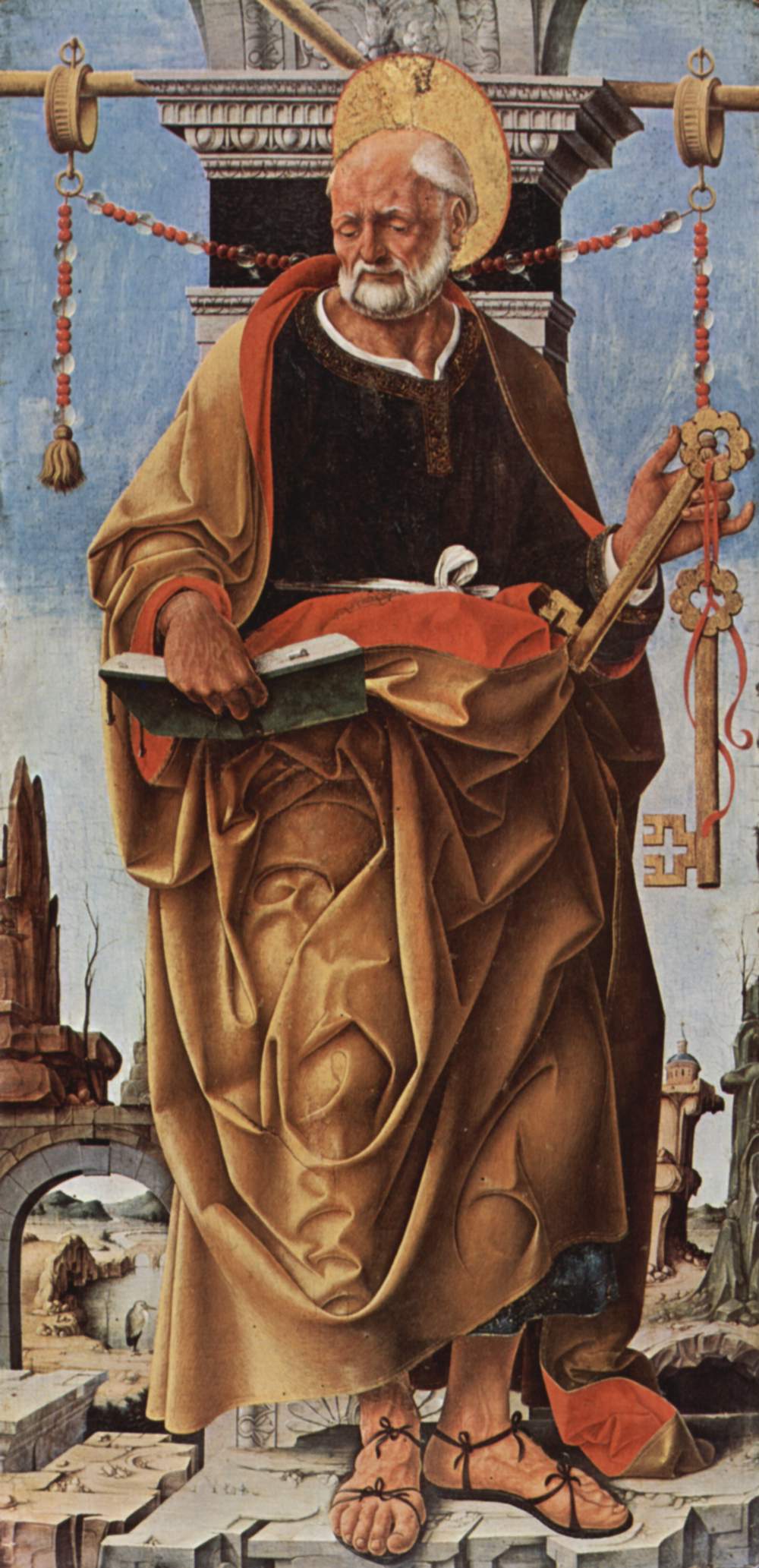- Francesco del Cossa
Francesco del Cossa (c. 1430 – c. 1477) was an Italian early-
Renaissance (orQuattrocento ) painter of the School of Ferrara.Biography
He is known to have been the son of a
stonemason inFerrara . Although little is known about his early works, it is known that he traveled outside of Ferrara in his late twenties or early thirties.Cossa is best known for his
fresco es. One of the first records we have of him is in 1456 when he was an assistant to his father, Cristofano del Cossa, at that time employed in painting the carvings and statues on the high altar in the chapel of the bishop's palace atFerrara .Allegorical frescoes in Palazzo Schifanoia
In conjunction with
Cosimo Tura , Cossa is now known for fresco decoration of the summer pleasure villa/palazzo known as thePalazzo Schifanoia , located just outside the city gates. Together, they painted a series of the elaborate allegories around the themes of zodiacal signs and months of the year. These were only partially restored in the 20th century, and there are three that are reasonably assigned to Cossa. Of these, one of the most remarkable images is the horde of naked toddlers in the "Allegory of May - Triumph of Apollo". Apparently a sign of springtime's prolific blossoming, the crowded rows of babies mass like a phalanx of infantile Rockettes.The "Allegory of April" has a depiction of the trio of Graces, one of the earliest Post-classical representations of the naked intertwined dancers in painting [http://www.artecultura.fe.it/index.phtml?id=244] .
Sandro Botticelli 's version in "Primavera" dates from 1482. See the 1501 version of the "Three Graces" (now atChantilly ). Assuming the date of death of Cossa is correct, this one must have been completed prior to the others.Cossa in Bologna
Unhappy that he had been paid by the square foot for his work for Duke Borso and complaining he was being paid the same as the "worst dauber in Ferrara", Cossa left Ferrara for
Bologna in 1470. In Bologna he obtained many commissions under the patronage of theBentivoglio family. Here he painted his two masterpieces: the "Virgin and Child with two saints and a portrait ofAlberto de' Catanei " (1474) and fresco of theMadonna del Baracano , representing the "Virgin and Child with portraits ofGiovanni Bentivoglio andMaria Vinziguerra " (1472).In the
National Gallery of London there is a picture by him representingSt. Vincent Ferrer , an "Annunciation", in the Dresden collection, which has been attributed toPollaiuolo , and a fine profile portrait at Locko Park near Derby, said to represent Duke Ercole I of Ferrara. He executed stained glass windows in Bologna, the best of which is a circular window, in the church of San Giovanni in Monte, representing St. John in Patmos; this bears his signature.Anthology of works
*"Annunciation and Nativity" (Altarpiece of Observation)(1470,Gemäldegalerie, Dresden) [http://commons.wikimedia.org/wiki/

]
*Griffoni Polyptych
*:"St Vincent Ferrer" (1473, National Gallery, London)
*:"St Peter and St John the Baptist" (1473, Pinacoteca di Brera, Milan)
*:"St Florian" 1473,National Gallery of Art, Washington)
*:"St Lucy" (1473, National Gallery of Art, Washington)
*:"The Crucifixion" (1473, National Gallery of Art, Washington)
*:"St Petronius" (1473, Palazzo dei Diamanti, Ferrara)
*:"11 other small pictures from altarpiece (1473, ?, ?)
*"Madonna with the Child and Saints"(1474, Pinacoteca Nazionale, Bologna)
*Frescoes for Hall of Months, Palazzo Schifanoia, Ferrara (before 1470?)
*:"Allegory of April: Triumph of Venus" [http://gallery.euroweb.hu/html/c/cossa/schifano/2april/2april.html] and [http://www.artecultura.fe.it/index.phtml?id=244]
*:"Allegory of May: Triumph of Apollo" [http://gallery.euroweb.hu/html/c/cossa/schifano/2april/index.html]
*:"Allegory of March: Triumph of Minerva" [http://gallery.euroweb.hu/html/c/cossa/schifano/1march/1march.html]
*"Polyhymnia, the Muse of Many Songs" [http://en.wikipedia.org/wiki/
]
*St Peter [http://en.wikipedia.org/wiki/
]References
*"Encyclopedia of Artists, volume 2", edited by William H.T. Vaughan, ISBN 0-19-521572-9, 2000
External links
* [http://gallery.euroweb.hu/html/c/cossa/index.html Web Gallery of Art]
Wikimedia Foundation. 2010.
